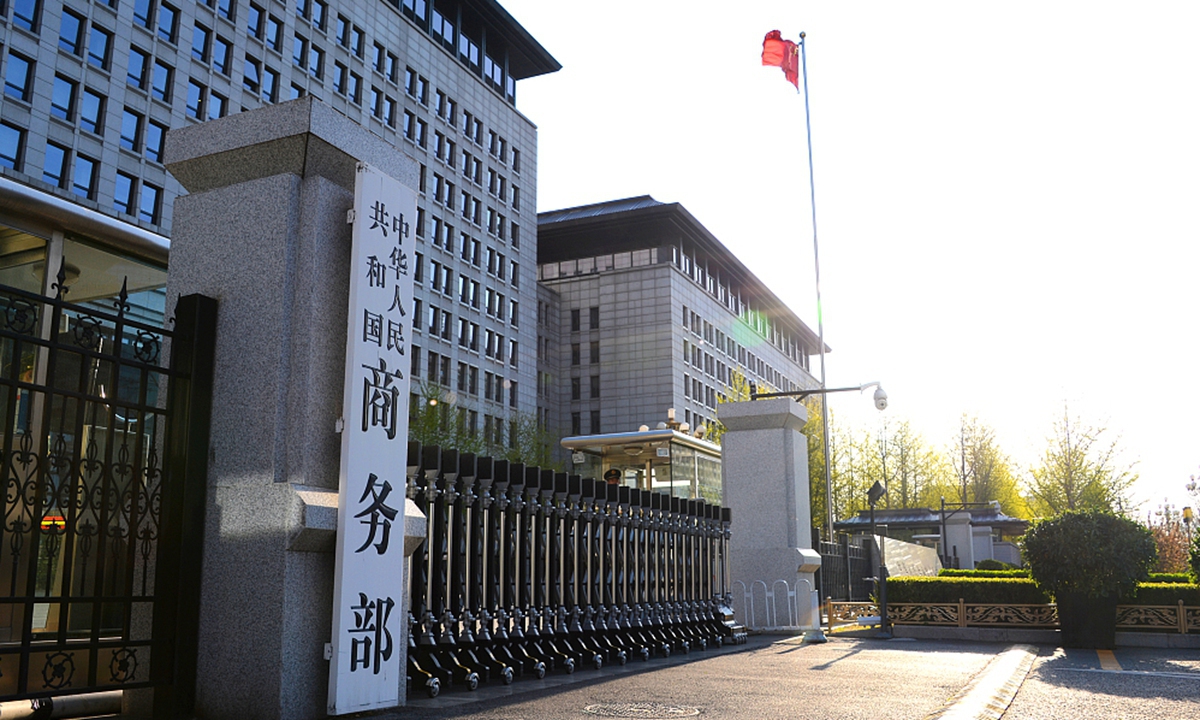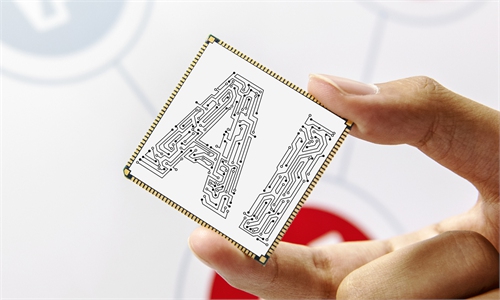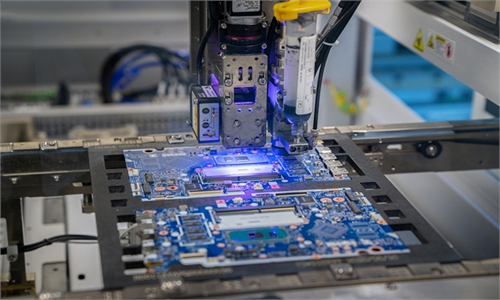China slams US’ chip ban attempt, warns legal liability
Seeking to exclude China from supply chain impractical, to backfire: expert

The Ministry of Commerce Photo: VCG
China's Ministry of Commerce (MOFCOM) on Wednesday called the US attempt to globally ban advanced Chinese computing chips a typical move of "unilateral bullying and protectionism" that seriously undermines the global semiconductor industrial and supply chains, warning that any organization or individual implementing or assisting with these US measures will face legal consequences.
The US Department of Commerce recently released a guidance that, under the pretext of so-called presumed violations of US export control rules, attempts to impose a global ban on advanced Chinese computing chips, including specific Huawei Ascend chips.
The US move deprives other countries of their right to develop advanced computing chips and high-tech industries such as artificial intelligence (AI), said a MOFCOM spokesperson.
The spokesperson said the US is abusing export controls to restrain and suppress China, which violates international law and the basic norms of international relations, severely harms the legitimate rights and interests of Chinese enterprises and undermines China's development interests.
The Chinese side stressed that the US measures are suspected of imposing discriminatory restrictions targeting Chinese companies, the spokesperson said, warning that any organization or individual that implements or assists in implementing these measures could be in violation of China's laws and regulations and may be held legally accountable.
The spokesperson urged the US to immediately correct its wrongdoing, abide by international economic and trade rules, and respect other countries' legitimate rights to scientific and technological development. The Chinese side will closely monitor the development of the US measures and take resolute actions to safeguard its legitimate rights and interests, the spokesperson added.
The US is once again escalating sanctions against Chinese tech companies with baseless charges, reflecting its "deep anxiety" in the technological competition with China, Chinese experts said, noting that these sanctions, like previous policies, will backfire, as US chip companies will ultimately pay the price for losing Chinese market.
Futile attempts
On May 13, the US Commerce Department announced actions to strengthen export controls on semiconductors worldwide, alerts industry to the so-called risks of using China's advanced-computing ICs, integrated circuits (ICs), including specific Huawei Ascend chips, risks violating US export controls and may subject companies to BIS enforcement action, per a statement by the department's Bureau of Industry and Security (BIS).
The guidelines specifically designate Huawei's Ascend AI chips - including models 910B, 910C and 910D - as restricted items.
In recent years, the US has steadily ramped up its chip-related sanctions against China, targeting the country's advances in areas like AI and high-performance computing.
The latest US sanctions represent a further escalation in Washington's crackdown on China's tech sector, and serve as yet another typical example of its long-arm jurisdiction, Ma Jihua, a senior industry analyst, told the Global Times on Wednesday.
"However, judging from BIS' guidelines, the export control measures against Chinese firms are based on speculation and lack solid evidence," Ma said. "This underscores the unjustified nature of the sanctions and also reflects the deep anxiety in the US over China's rapid progress in advanced chip technologies."
Ma pointed out that previous US attempts to suppress Chinese tech firms have largely fallen short. "Instead of being stifled, China's semiconductor industry has continued to gain momentum," he said, adding that the latest global ban is unlikely to deliver the intended results either.
Huawei's Ascend 910B AI chip has managed to surpass NVIDIA's A100 AI GPU by up to 20 percent in training performance, according to Wang Tao, chief operating officer of Huawei Ascend and Kunpeng department. Wang said that Huawei has managed to close the gap with NVIDIA's A100, per Wccftech.com, a US-based outlet on technology and gaming publication.
Japan's Mizuho Financial Group analyst Vijay Rakesh revealed that "In China, we estimate Ascend 910a/b/c potentially at 700000 units in 2025," another Wccftech report said. The report also highlighted Huawei's 910C GPU as China's DeepSeek moment for its still-fledgling semiconductor sphere.
Meanwhile, Huawei is also redefining next-generation AI infrastructure through system architecture innovation. Huang Jin, Vice President of Huawei Cloud, announced last week that Huawei Cloud has innovatively launched the CloudMatrix 384 super node, China Media Group (CMG) reported on May 17.
The system links up to 384 accelerator cards into a unified super cloud server, delivering peak performance of up to 300 petaflops, which is 67 percent higher than comparable industry offerings, per the CMG report.
"The US genuinely fears Huawei's achievement of technological self-reliance," He Weiwen, a senior fellow at the Center for China and Globalization, told the Global Times on Wednesday, adding that Huawei's tech breakthrough not only enables the company to reduce dependence on US technology but may also surpass US' dominance in certain fields.
He further cautioned that attempting to exclude China from the global chip supply chain is impractical and could significantly harm the interests of the US semiconductor industry and its companies. The US chip giant Nvidia also voiced opposition about the US new curb measures.
The US' export control on AI chips to China were "a failure," Nvidia CEO Jensen Huang said on Wednesday, CNBC reported. Huang added that "the fundamental assumptions that led to the AI diffusion rule in the beginning, in the first place, has been proven to be fundamentally flawed."
Despite the US export controls on AI chips, the US chipmaker is seeking to build a research and development center in Shanghai that would help it to stay competitive in China, where its sales have slumped due to tightening US export controls, Financial Times reported on May 16.
Earlier in May, Huang stressed that China's AI market will likely reach about $50 billion in the next two to three years, and that missing out on it would be a "tremendous loss," per a CNBC report on May 6.
Resolve to hit back
In face of the US' abuse of exports control measures and long-arm jurisdictions, Chinese experts highlighted that China possesses both the resolve and sufficient, decisive countermeasures to safeguard its legitimate interests, if the US measures are implemented.
China unveiled regulations on implementing the anti-foreign sanctions law, comprising 22 articles, which took effect in late March 2025. According to the regulations, the country will enhance its countermeasures and the enforcement of such countermeasures.
"If the US moves forward with its hegemonic measures, China will have no choice but to respond," Shi Xiaoli, professor from the China University of Political Science and Law, told the Global Times on Wednesday, noting that China has plenty of options in its toolkit that are both effective in safeguarding its own legitimate rights and interests and are in line with international common practices.
Earlier this week, a MOFCOM spokesperson said the US' move has seriously undermined the consensus reached during the high-level China-US talks in Geneva, and urged the US to rectify its wrongdoing.
The spokesperson urged the US side to work with China to jointly safeguard the consensus reached in the high-level talks in Geneva, and promote the building of sustainable, long-term and mutually beneficial bilateral economic and trade relations.



